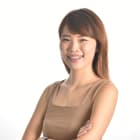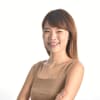'It can be very overwhelming': Former radio DJ Petrina Kow on caring for her late mum who had cancer
The former radio DJ looks back on what it was like to take care of her terminally ill mother in 2002, and how that experience helped her relationship with her own caregivers when she had cancer in 2020. As told to CNA Women’s Sharon Salim.
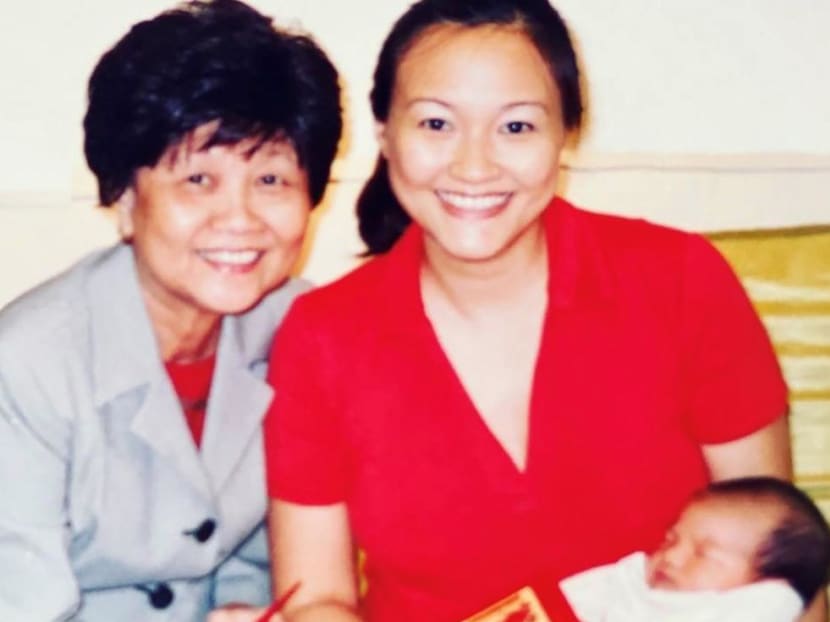
Petrina Kow reflects on her three-year caregiving journey with her late mum, who passed away from lung cancer in 2005. (Photo: Petrina Kow)
I was in Taiwan celebrating Chinese New Year with my husband’s family when I found out that my mum had cancer. It was 2002 and I had gotten married a few months before, in November. It was my first Chinese New Year abroad.
All throughout 2001, Mum was having this cough. She generally tried to live with it and only went to see the general practitioner if it was more serious.
Dad delivered Mum’s confirmed diagnosis over the phone: Stage 4 lung cancer – it turned out that there was a lump in her left lung.
I heard my dad break down. You don’t normally see your dad crying, and him expressing his vulnerability and grief at that point affected me – but not in a bad way. It showed me that it was okay to be upset, and this is something we had to deal with as a family.
It was a big blow to me. I felt a physical sensation of being punched in the gut and felt a little lost. It was very unexpected. I asked Dad what I should do. He told me to come home once I finished my holiday.
PULLING TOGETHER AS A FAMILY
I never got to see Mum’s reaction to her diagnosis but when my husband and I came back from the holiday, I could tell she was clearly upset. She had to quickly prepare for surgery, which would remove the tumour and half of her left lung.
My family and I immediately went into “solving mode”, put our work hats on to face this and work through it together. At this point, my dad was the main decision maker. I have an older sister, and as the younger sibling, I was kept informed in the family discussions.
I was relatively young then – I was 26, and I was just starting my own family. It was still very confusing, and it wasn’t too long ago that I had moved out of my family home.
Mum went for the surgery shortly after her diagnosis.
After her operation, she began treatment, including chemotherapy and radiation therapy. But the major shift happened when she had a stroke shortly after the surgery, had to retire and stop teaching as she had lost her speech.
As she couldn’t string her sentences together fully, it was impossible for her to teach.
QUITTING HER JOB TO SPEND TIME WITH MUM
A few months later, in May 2002, I decided to quit my radio job to spend more time with Mum. I was then a radio deejay hosting the morning show at Class 95FM.
It was also around the time I found out I was pregnant with my first child. People thought I quit because I was pregnant, but I didn’t know about the pregnancy until after I had resigned. Still, I was lucky to be able to continue with my voiceover work on a freelance basis.
It was difficult and jarring for me to see someone who was so vivacious and larger-than-life becoming quiet and not saying very much.
I remember I wasn’t doing much of the ferrying to and from the hospital – Dad did most of it. I visited her at the hospital, did a few sessions of treatment with her, and brought her to speech therapy as she struggled to say everyday words like cup or bread.
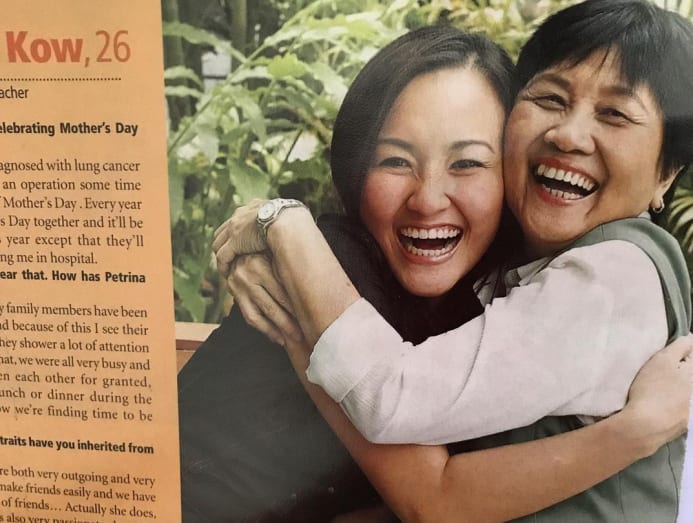
I was very glad that I quit my full-time job. I could spend the next year and a half travelling and hanging out with her, such as bringing her to the park. I gave birth to my first child in January 2003 – she got to witness it, and was quite involved in the first year or so.
BEING A CAREGIVER TO SOMEONE CLOSE TO YOU
When she was diagnosed with late-stage cancer, she was 56, relatively young. She was a very active person with a large social circle. As an only child, she’d always sought out friends. Whether it was a game of mahjong or craft projects, she kept involved.
The hardest part of being a caregiver was not knowing what to do, recognising it, and being brave enough to talk about it with the person.
It was difficult and jarring for me to see someone who was so vivacious and larger-than-life becoming quiet and not saying very much. Because of the stroke, she wasn’t able to say how she felt, so I don’t know how much she struggled. She wrote some letters afterwards, and even then, it was difficult for her.
The hardest part of being a caregiver was not knowing what to do, recognising it, and being brave enough to talk about it with the person. It also depends on your existing relationship with the person, the condition the person is in, and whether you’re able to have conversations such as: If you’re ever in a wheelchair, do you want to be at home or have a helper?
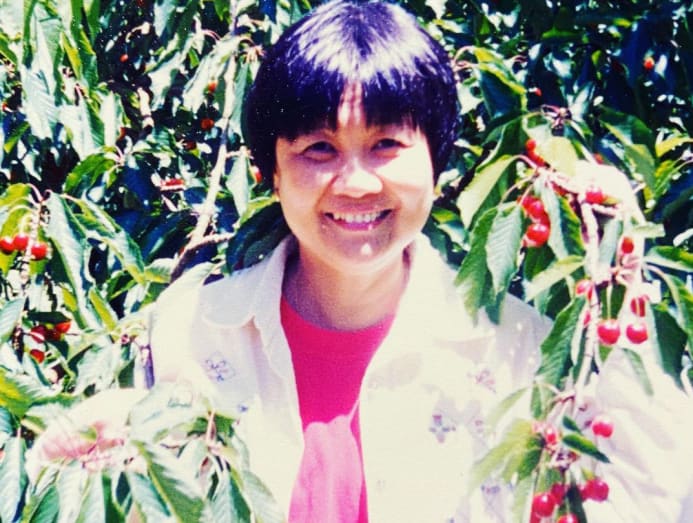
While it’s difficult to have these conversations with the person you’re caring for, it’s a good thing if you’re able to do so – talking about how they would want to be treated could alleviate the stress for them. At the end of the day, it’s their journey.
It’s really tricky, and if the caregiver is attuned to the needs of their loved ones, sometimes just making the decisions and telling them about it, such as, “I think this is what we should do, what do you think?”, the person being cared for can feel very grateful as they don’t have to think about it.
PRIORITISING SELF-CARE AS A CAREGIVER
In hindsight, I learned that the best thing you can do as a caregiver is to take care of yourself. When you’re put in the privileged position of caring for someone, it can be very overwhelming. Just like a parent, it’s not going to do any good if you are burnt on all ends.
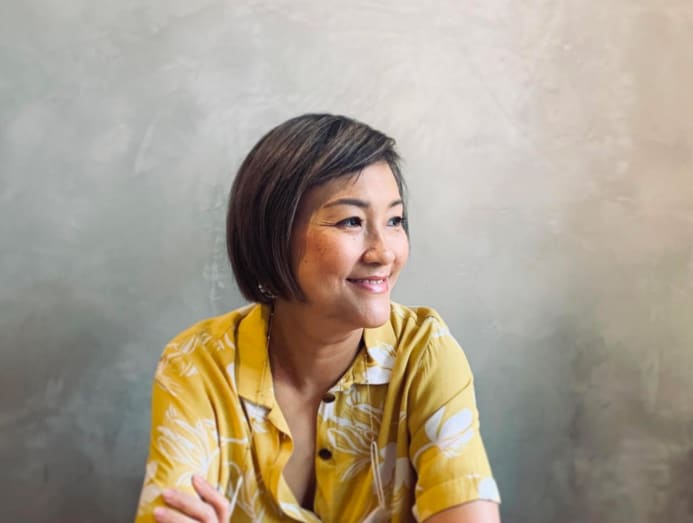
This is because for people who’ve been diagnosed with an illness, they will very quickly think about what’s going to happen to their loved ones, especially if they have young dependents. “What’s going to happen with my child?” – that would be the predominant thought, other than what’s going to happen to themselves.
I learned that the best thing you can do as a caregiver is to take care of yourself.
When I heard about Mum’s cancer, I was worried about her. But I didn’t think about what was going to happen to me when I lose a mum – you don’t necessarily think about yourself.
Mum eventually passed away in February 2005, three years after her diagnosis. She was 59.
ACTION PLANS RECOMMENDED IN THE WHITE PAPER TO SUPPORT CAREGIVERS
In a bid to take better care of caregivers – many of whom are women as they tend to shoulder a heavier load in caregiving – the government’s White Paper on Women's Development released on Mon (Mar 28) includes the following plans:
- Enhancing a range of respite care services catering to the different needs of caregivers, such as a centre-based respite for a few hours in the day. “Caregivers can use this time away from their caregiving duties to self-care,” said a spokesperson from the Ministry of Health.
- Enhancing the Home Caregiving Grant to reduce financial strain on caregivers – from S$200 per month currently to S$400. This applies to beneficiaries with a monthly per capita household income of up to S$1,200, or beneficiaries with no income who live in a residence with an annual value of up to $13,000
- Forming community-based peer support networks for caregivers
- Broadening the service scope of the Household Services Scheme (which provides households with more help for domestic needs), to include basic child- and elder-minding services
- Expanding the Seniors’ Mobility and Enabling Fund to encourage care in the community
- Promoting the Agency for Integrated Care as a one-stop resource for caregivers of seniors aged 65 and above
- Enhancing access to affordable and quality preschools for families to better support women and families with young children in their caregiving needs – 80 per cent of preschoolers to have a place in a government-supported preschool by around 2025
- Developing mother-and-child health and wellbeing strategies
- Enhancing inclusion and support for caregivers of persons with disabilities and children with developmental needs
- Developing solutions relating to self-care and mutual support for caregivers of persons with disabilities by Alliance for Action (AfA), a working group that supports issues faced by caregivers of persons with disabilities
GETTING CANCER HERSELF
I was diagnosed with Stage 2 nasal cancer in December 2020. I was already dealing with the symptoms – I had a blocked nose on one side, I had to breathe out from the other side, and I had a couple of nosebleeds.
At first I thought I was just heaty, so I went to see a TCM doctor. Finally I was referred to a Ear Nose and Throat specialist, and when she scoped me and saw this lump, her reaction made me feel like she knew it wasn’t good.
She explained that the lump wasn’t supposed to be there, and sent a sample of it for a biopsy. She told me to come back in a few days to discuss the results.
When I found out I had nasal cancer, I was quite surprised, but I also felt a huge sense of relief as now that we knew what it was, we could fix it. My first thought was how my two children were going to take this.
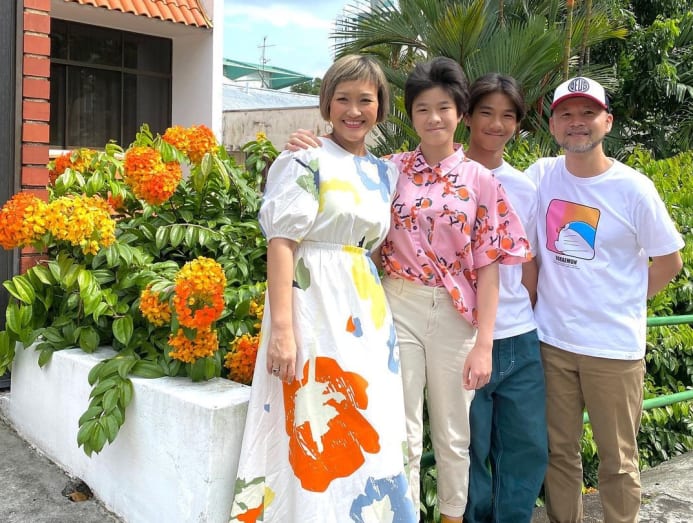
I was very glad that my elder daughter, who was 18 then, was with me when my doctor delivered the news. That really helped her – that she heard it from the horse’s mouth, and not the “pared down” version from me.
I told my 13-year-old son over the phone. He was worried, and was in a certain phase of his growing years where it’s hard to express how he felt. I was worried about that.
I was very thankful for my doctors who were very reassuring and said “we can fix this” – the prognosis was very positive and hopeful. My treatment plan was very clear, intense and short: I’d see my radiation oncologist every day for seven weeks, and I’d go for chemotherapy once a week at the same time.
I started treatment immediately in mid-December, and I was done with it by the end of January 2021. From February onwards, I focused on my recovery. I only accepted my first voiceover or hosting stint four months after.
Being a caregiver doesn’t come with an instruction manual. But being present and being aware of how you feel is enough.
During that time, my husband and kids became my caregivers. When I was warded in the hospital in February for a week to get my nutrients (as I wasn’t able to eat anything), my daughter stayed with me for a few nights. She’d also hang out with me there after school.
I tried to find many ways to engage them in their caregiving journey. I’d make it a point to avail myself to them to talk about how they felt and things they wanted to talk about. It’s okay to feel confused, I told them.
RAISING AWARENESS FOR CAREGIVERS
I shared on my Instagram account that having been both a caregiver and being the one cared for, I reckon being a caregiver is about helping a loved one navigate a new reality.
Being a caregiver doesn’t come with an instruction manual. But being present and being aware of how you feel is enough.
I decided to share my experience of being my mum’s caregiver as part of the “I Can. We Will” lung cancer campaign, to raise awareness and equip both patients and caregivers with the resources to communicate well with their loved ones and healthcare providers.
Remember to take care when giving care – especially of yourself. The person that you are caring for will thank you.
As a patient myself and having had my own caregivers, there were moments in my own cancer journey where I wondered if this was going to be a last moment with someone. I remember slowing down and taking in the moment with them – becoming aware of my breath, my thoughts and the details of the moment.
Ironically, when I was my mother’s caregiver, I didn’t have the wisdom to do that with her – I remembered thinking to myself to always put on a happy face, and when in doubt, deny and distract.
But this was not what I wanted from my caregivers at all. I wanted care, concern, curiosity – and I welcome crumble and confusion, too.
I shared on Instagram that I wanted to enfold them into my experience as much as possible, so we could journey together and emerge stronger.
So, the next time you are caregiving for someone, remember to take care when giving care – especially of yourself. The person that you are caring for will thank you.
CNA Women is a section on CNA Lifestyle that seeks to inform, empower and inspire the modern woman. If you have women-related news, issues and ideas to share with us, email CNAWomen [at] mediacorp.com.sg.


